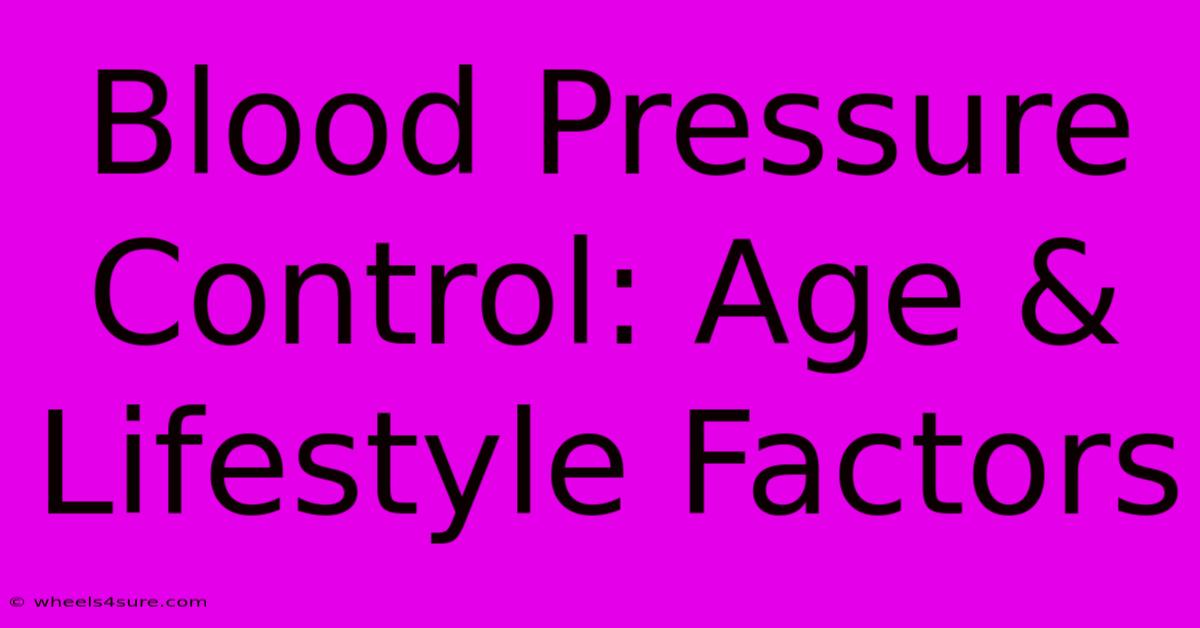Blood Pressure Control: Age & Lifestyle Factors

Table of Contents
Blood Pressure Control: Age & Lifestyle Factors
Maintaining healthy blood pressure is crucial for overall well-being, but the journey to optimal blood pressure management is deeply intertwined with age and lifestyle choices. Understanding how these factors influence blood pressure allows for proactive strategies to prevent hypertension and its associated health risks.
Understanding Blood Pressure and its Relation to Age
Blood pressure, the force of blood against your artery walls, is measured in millimeters of mercury (mmHg) with two numbers: systolic (top) and diastolic (bottom). High blood pressure, or hypertension, is generally defined as a reading consistently above 140/90 mmHg.
Age plays a significant role in blood pressure: As we age, our arteries naturally become less flexible and more rigid. This stiffening increases resistance to blood flow, leading to higher blood pressure. This age-related increase is a gradual process, making regular monitoring essential. While many older adults develop hypertension, it's not an inevitable consequence of aging; lifestyle modifications can significantly impact blood pressure at any age.
Blood Pressure Changes Across Different Age Groups:
- Young Adults (18-40): Blood pressure tends to be relatively low in this group. Maintaining a healthy lifestyle is crucial for establishing a foundation for long-term cardiovascular health.
- Middle-Aged Adults (40-60): This is a critical period where lifestyle factors significantly impact blood pressure. Pre-hypertension and hypertension become more common, highlighting the importance of regular check-ups and lifestyle adjustments.
- Older Adults (60+): Blood pressure often continues to rise with age. Careful management is crucial to reduce the risk of stroke, heart attack, and other age-related cardiovascular complications.
Lifestyle Factors Impacting Blood Pressure
While age contributes to blood pressure changes, lifestyle choices are powerful determinants of its levels. Adopting healthy habits can mitigate age-related increases and significantly reduce the risk of hypertension.
1. Diet: The Cornerstone of Blood Pressure Control
What to Eat:
- Fruits and vegetables: Rich in potassium, which helps counter the effects of sodium.
- Whole grains: Provide fiber, supporting heart health.
- Lean proteins: Choose poultry, fish, and beans over red meat.
- Low-fat dairy: Calcium and other nutrients support healthy blood pressure.
- DASH Diet: The Dietary Approaches to Stop Hypertension (DASH) diet is specifically designed to lower blood pressure naturally.
What to Limit:
- Sodium (salt): Excess sodium increases fluid retention, raising blood pressure.
- Saturated and trans fats: Contribute to cholesterol build-up in arteries.
- Processed foods: Often high in sodium, saturated fat, and sugar.
- Sugary drinks: Linked to weight gain and other health problems that impact blood pressure.
2. Exercise: A Powerful Blood Pressure Regulator
Regular physical activity strengthens the heart, improves blood vessel function, and promotes weight management, all of which contribute to lower blood pressure. Aim for at least 150 minutes of moderate-intensity aerobic exercise or 75 minutes of vigorous-intensity aerobic exercise per week, spread throughout the week. Include strength training exercises at least twice a week.
3. Weight Management: The Link Between Obesity and Hypertension
Obesity is a significant risk factor for hypertension. Excess weight puts extra strain on the heart and blood vessels, increasing blood pressure. Achieving and maintaining a healthy weight through diet and exercise is crucial for blood pressure control.
4. Stress Management: The Mind-Body Connection
Chronic stress elevates blood pressure. Employing stress-reducing techniques like yoga, meditation, deep breathing exercises, and spending time in nature can positively impact blood pressure levels.
5. Alcohol Consumption: Moderation is Key
Excessive alcohol intake can significantly raise blood pressure. Moderate consumption (if at all) should be considered, adhering to recommended guidelines.
6. Smoking Cessation: A Critical Step
Smoking damages blood vessels and increases blood pressure. Quitting smoking is one of the most impactful lifestyle changes for cardiovascular health and blood pressure control.
Seeking Professional Guidance
Regular blood pressure checks are essential, especially as we age. Consult your doctor to discuss your blood pressure readings and develop a personalized management plan. They can assess your individual risk factors and recommend appropriate lifestyle modifications or medical interventions if needed. Early detection and proactive management are key to preventing and managing hypertension throughout your life.
Disclaimer: This article provides general information and should not be considered medical advice. Always consult with a healthcare professional for any health concerns or before making any decisions related to your health or treatment.

Thank you for visiting our website wich cover about Blood Pressure Control: Age & Lifestyle Factors. We hope the information provided has been useful to you. Feel free to contact us if you have any questions or need further assistance. See you next time and dont miss to bookmark.
Featured Posts
-
The Key To Ravindra Jadejas Age Defying Career
Apr 04, 2025
-
Tik Tok Galaxy Prices A Comprehensive Guide
Apr 04, 2025
-
My Daughter Marioo The Light Of My Life
Apr 04, 2025
-
The Untold Story Of David And Sauls Daughter
Apr 04, 2025
-
Himani Shahs Daughter A New Chapter Begins
Apr 04, 2025
